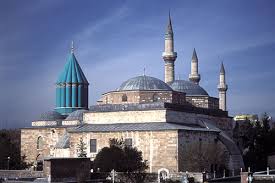Al-Huda
Foundation, NJ U. S. A
the Message Continues ... 12/113
Article 1 - Article
2
- Article 3 -
Article 4
- Article 5 -
Article 6 -
Article 7 -
Article 8 -
Article 9 -
Article 10 -
Article 11 -
Article 12
Newsletter
for January 2011

Jalaluddin Rumi
Molana Jalal-e-Din Mohammad Molavi Rumi
was born near Balkh present-day Afghanistan) on September 30,
1207. Threatened by the Mongol conquests of Ghengiz Khan, Rumi's
family fled westwards, through Baghdad and Nishapur (where Rumi
met Farid al-Din 'Attar) before finally settling in the Seljuk
kingdom of Konya, in what is now Turkey. Rumi followed his
father in becoming an outstanding scholar and theologian, but in
1244 met the travelling derwish, Shams of Tabriz, who
transformed his spiritual life. Sufism is the the strain of
Islam that places direct and ecstatic communion with Allah over
the rules prescribed by the Shari'ah, and, with his eyes now
opened, Rumi began work on his Masnavi (closed rhyming
couplets), which was to grow to 24,000 verses. Later he wrote
the equally well-known Divan-e Shams-e Tabriz (the collective
poems of Shams of Tabriz). As is usual with mystics, Rumi was an
immensely practical man, founding the Mevlevi order at Konya,
the whirling dervishes, which is still a thriving community. He
died on December 17, 1273, recognised then and since as one of
the greatest of poets and spiritual thinkers.
Rumi's
poetry
The Masnavi
is an extended narrative of some 27,000 lines containing
Sufi
philosophy and ethics, meditations, anecdotes and stories of all
kinds. More than that, the work traces man's spiritual journey
through the world with all its pitfalls, from first awakening to
final union with the One. And in incorporating sacred history,
simple tales, earlier Sufi writings, learned discourses of
predecessors, and the lives of saints, Rumi discusses nearly
every aspect of Islamic metaphysics, cosmology and traditional
psychology. Like many such poems of medieval Islam, the masnavi
blends instruction with delight, and its pithy comments and
apparently simple but astute remarks are
still
quoted today. The
Diwan-e Shams
is a
40,000-odd
verse collection of ghazals (lyric poems). Rumi also wrote a
Ruba'iyyat (quatrains),
and extended prose works: the Fihi ma fihi (discussions
on spiritual matters), the Makatib (collection of
letters) and the Majalis-i sab'ah (sermons).
Sufi poetry
Rumi's
ghazals
are ecstatic poems of spiritual love portrayed in reflections on
its earthly expression. His poetry created an elaborate
vocabulary of wine and physical beauty, which took further the
Sufi poetry of
Sana'i
and
Attar,
and inspired its greatest proponent,
Hafez
of Shiraz. The ghazal tradition draws on features of medieval
Islamic life, and can be difficult for westerners to appreciate,
appearing somewhat unworldly, melancholy and artificial. The
lover is male, and is addressed through degrees of emotional
rapport, which are
not
necessarily or generally physical. The verse exploits the
rhyming facility of
Persian,
but allows great freedom and ambiguity within its set
requirements.
Words are often used as symbols, which play with great richness
and ingenuity on the understandings of a world steeped in
Islamic thought and poetry.
Reading the Persian
Since that world cannot be appreciated
without a deep understanding of Islamic culture,
start
with general introductions to the history of the area, which is
fascinating enough. It will also help enormously to read
sufficient Persian to sense the sound and structure of the
poetry, and there exist many courses, books and CDs in what is
not overly difficult language: languagequest, easypersian,
arthur lynn, farrangsara, languageresourceonline. For the
critical literature generally, try as always the bibliography in
the The New Princeton Encyclopedia section on Persian
Poetry, E. Browne's A Literary History of Persia(1902-24:
several reprints, none cheap), A. Schimmel's A Two-Colored
Brocade: The Imagery of Persian Poetry(1992: good
bibliography), and listings given on tehran at stanford,
columbia and cornell. Many translations can be found on the
internet, some excellent: rumi.org, rumionfire, tearsofllorona,
wahiduddin, b.h. far, persepolis and iransaga.
HOME
-
NEWSLETTERS - BOOKS
- ARTICLES
- CONTACT - FEEDBACK
DISCLAIMER:
All material published by Al-Huda.com / And the Message
Continues is the sole responsibility of its author's).
The opinions and/or assertions contained therein do not
necessarily reflect the editorial views of this site,
nor of Al-Huda and its officers.
Copyright © 2001
Al-Huda,
NJ
USA